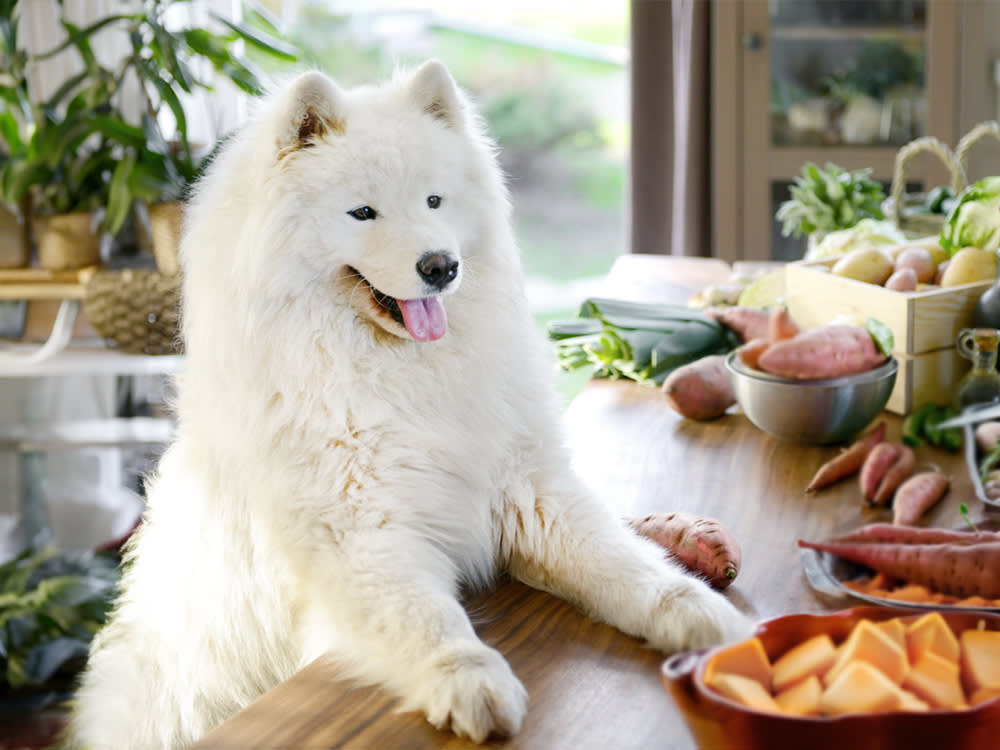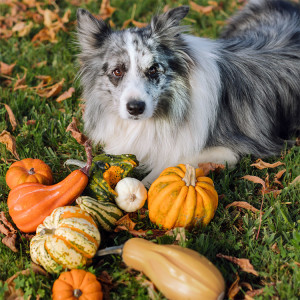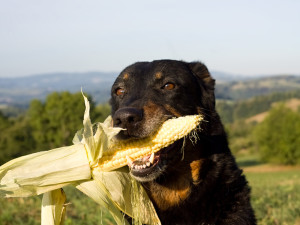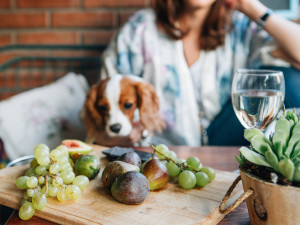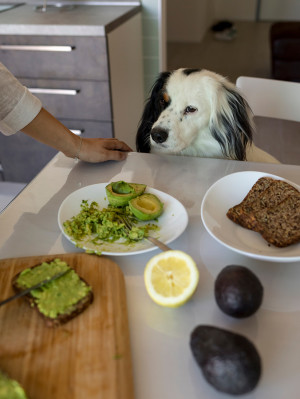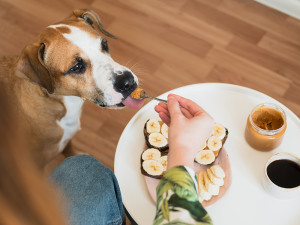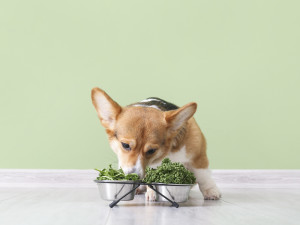Do you know what a yam is? If you live in the US, you may be confused about the difference between sweet potatoes and yams — and it may not be your fault. Often, products containing sweet potatoes are labeled as yams, and so many of the foods we think of as yams are actually sweet potatoes. Technically, yams are starchy tubers with pale flesh that are grown in tropical places, while sweet potatoes are actually roots of a different plant with bright orange flesh that can be grown in the US.
In other parts of the world, unrelated plants are also called yams including taro root and oca. Taro root and some species of oca may be toxic to dogs, so be sure you know which one you are actually buying.
The good news is that both yams and sweet potatoes are loaded with fiber and vitamins and are safe, healthy foods to share with your pup. They can be incorporated into your dog’s diet as long as you follow some general guidelines. It is important to ensure your dog is eating a complete and balanced dog food diet, so whenever you consider adding on table food or treats, be sure to keep it to a minimum. Read on to learn all about yams for dogs.
Nutrition facts about yams for dogs
Yams come from the plant species Dioscorea, found throughout tropical regions of Latin America, the Caribbean, Asia, and Africa. The edible part of the plant is a tuber, or an underground outcropping of the stem that is used to store starch as an energy source for the plant. These tubers have thick, rough skin that is not edible and tend to have a long, knobby shape. The inner flesh is pale in color and very starchy. The main nutrient in yams is starch, a form of carbohydrate. They also contain fiber and minerals including potassium, calcium, magnesium, zinc, and manganese. Other beneficial properties come from bioactive compounds including phenols and flavenoids which have antioxidant properties as well as anti-inflammatory and immune boosting benefits.
How much do you spend on your pet per year?
Are yams good for dogs?
Cooked yams are good for dogs in moderation. They contain some important nutrients that dogs need and can make excellent treats or ingredients used in a complete and balanced diet. On their own, they do not contain all of the nutrients dogs need, however, so it is very important that your pup gets the bulk of their calories from a balanced diet. If they fill up on too many treats or table foods, they may not eat enough of their dog food and this can lead to nutritional deficiencies in the long run. Here are some of the main benefits your pup can get from eating yams:
Carbohydrates: The main nutrient in yams is starch, a form of carbohydrate. Dogs use carbohydrates for energy.
Fiber: Yams contain cellulose and lignin, forms of insoluble fiber. This kind of fiber helps to create bulk in the digestive tract which can prevent constipation and create feelings of fullness without adding lots of fat or calories. This is helpful for dogs who may need a low fat or low-calorie diet to encourage weight loss or control other health conditions. Fiber also helps to prevent spikes in blood sugar, which is important for diabetic dogs.
Vitamins and minerals: Yams contain potassium, calcium, magnesium, zinc, manganese, and many other vitamins and minerals that are vital to your dog’s daily nutrition. These are all present in adequate amounts in complete and balanced dog food diets, so any additional vitamins and minerals they get from snacks like yams are an added bonus.
Bioactive components: These include phenols, flavonoids and other compounds within the plant that may have beneficial health effects. Some of these compounds are known antioxidants, which can protect cells from oxidative damage and may have protective effects against cancer, aging, inflammation, heart disease, and/or harmful germs like certain bacteria and viruses.
Can dogs eat raw yams?
Raw yams are very fibrous and difficult to digest. These are not recommended for dogs. They can cause gas and bloating as they will break down very slowly within the digestive tract and can make your dog feel very full, uncomfortable and cause digestive upset. Large pieces of raw yams are also very hard and may be difficult for your dog to safely chew up, creating a possible choking hazard. Since they are so fibrous, nutrients cannot be extracted as well from their raw form, so it is actually less healthy for your pup, too.
Are yams completely safe for dogs?
Plain, cooked yams are safe for dogs in moderation. There are a few important points to keep in mind when considering sharing yams with your pup:
High oxalate content: Oxalates are a product of the breakdown of certain foods during digestion, especially plants. They are normally excreted in the urine. This is not a problem for most dogs; however, they can contribute to the formation of bladder stones. If your dog has had bladder stones in the past, specifically calcium oxalate stones, they should avoid snacks that are high in oxalates like yams. For other dogs, the occasional snack of yams is harmless as far as the oxalate content goes.
High starch content: Yams are a high starch food that do not contain much protein or fat. This is fine for most dogs as an occasional snack food or as part of a balanced dog food diet. The risks with feeding lots of starches and carbohydrates in general is that they can lead to weight gain and do not provide the important nutrients dogs need from other sources like fats and proteins. This is especially important to avoid in dogs that are already overweight, have joint problems, and/or are diabetic.
Beware of imposter “yams”: If you recall, there are other starchy roots and tubers that may be called yams in different parts of the world. In the US, sweet potatoes are often called yams, which is harmless as far as dogs are concerned since sweet potatoes are also a safe and healthy food. However, in other parts of the world, taro root and oca root are sometimes called yams. These plants are considered toxic to dogs in certain forms. Taro root opens in new tabis toxic in its raw form but may be ok if boiled, so best to proceed very cautiously. Oca root is in the Oxalis familyopens in new tab of plants, which is also considered toxic to dogs. It is still under investigation as to whether or not it is safer once cooked, but to be safe, it should be avoided.
Look out for other ingredients: While plain cooked yams are safe for dogs, if they are cooked with other ingredients that are toxic to dogs, they should be avoided. This includes candied yams that may have a lot of added sugar, yams cooked with onions, garlic, certain nuts, spices, seasonings, or lots of fats like butter or oils that may be unsafe for dogs. Be sure to double check that any added ingredients are safe and nontoxic for your pup before sharing.
The bottom line: Can dogs eat human food?
Dogs can and do eat many of the same foods that we do. It is important to remember that dogs have unique nutritional requirements that differ from ours, so they cannot be their healthiest if they fill up on table scraps alone. They need to eat a complete and balanced diet intended for dogs to meet their daily nutritional needs. All treats and table scraps should make up less than ten percent of their total caloric intake to ensure they are mostly eating their dog food. And while many human foods are safe to share with your dog in moderation, there are also a number of foods that are toxic and/or unhealthy for dogs and should always be avoided.
Be sure to do your research if you are unsure if a food is safe for your dog, or consult a pet poison hotline and your veterinarian if you cannot find a clear answer. Finally, work on discouraging your pup from begging at the table or following around every guest with a snack. Use treats and table snacks as training opportunities. Teach your pup cues to go to their crate, mat, or sit and wait until you bring them a snack and then reward them for their good behavior. The more consistently you reinforce these cues, the sooner your pup will learn what you expect and can show off their brilliant skills for you and your guests.
Other foods that are safe for dogs:
Turkey can be a good treat in moderation as long as you follow some simple guidelines
Apples can be a crunchy, high fiber snack for your dog
Kale is another superfood you and your pup can share
Other foods that are dangerous for dogs:
Grapes are considered toxic and should never be shared with your pup
Chocolate is one of many toxic foods your dog cannot safely eat
Raw dough is also dangerous for dogs
FAQs (People Also Ask)
How many yams can a dog eat?
Plain cooked yams are safe and healthy for dogs in moderation. They should never make up more than ten percent of your dog’s daily intake if they are being served as treats. It is important to start with a small amount to ensure they tolerate it okay.
Is it OK to give dogs raw yams?
Raw yams are not a safe food for dogs. They are too fibrous and difficult to digest, which can lead to digestive upset, bloating, and pain.
Why do dogs like yams?
Cooked yams are soft and starchy and may have a satisfying texture for dogs. Since they are very starchy, they also provide a good source of energy for dogs.
Can dogs eat yams?
Yes, plain cooked yams are safe for dogs. However, in different parts of the world, different foods are called yams and not all of them are safe for dogs.
Are yams good for dogs?
Yes, in moderation, yams provide carbohydrates, fiber, vitamins, minerals and antioxidants which are all beneficial for dogs.
